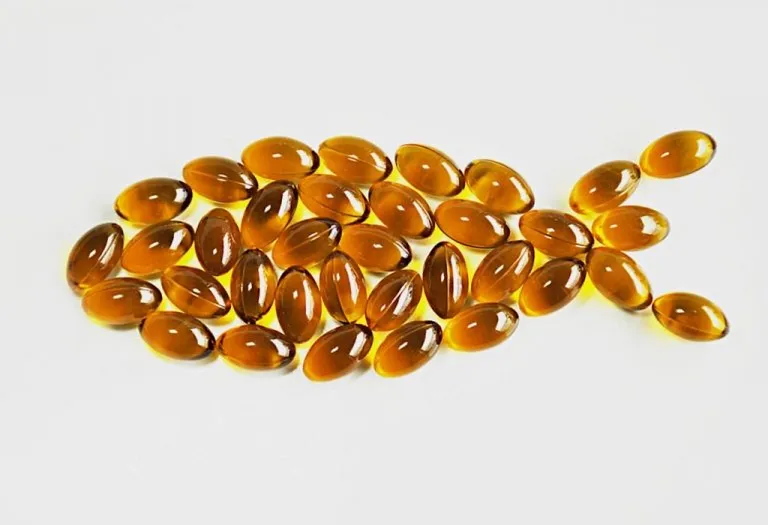Fish Oil During Pregnancy – Benefits, Risks & More

There are many benefits of consuming fish oil as a supplement. It contains Omega-3 fatty acids, which are highly beneficial when fighting heart disease. But is fish oil good for you when you are pregnant? Fish oil, rich in omega-3 fatty acids like DHA and EPA, is often recommended during pregnancy for its potential benefits to both mother and baby. These essential nutrients play a crucial role in fetal brain and eye development, support maternal heart health, and may even help reduce the risk of preterm birth. However, concerns about side effects raise important considerations for expectant mothers. In this article, we’ll take a closer look at the benefits of fish oil in pregnancy, the possible risks, and how to use it safely to support both mom and baby’s health.
Can You Take Fish Oil While Pregnant?
The short answer is that yes, fish oil is safe during pregnancy. Not only is it safe, but it is also beneficial to you and your baby. Fish oil is usually consumed either in the form of supplements or directly by eating a fish-rich diet. The supplements are also enriched with Vitamin E to make it last longer. Research has indicated that omega-3 fish oil and pregnancy are closely linked, and mothers who take fish oil supplements have children with better brain development (1).
Benefits of Fish Oil for Pregnant Women
There are many reasons why you must incorporate fish into your diet or take fish oil supplements rich in Omega-3 fatty acids during pregnancy. These include:
- Immunity: When pregnant women take fish oil supplements, the child is usually observed to have a more robust immune system (2).
- Mood: It has been observed that children whose mothers had taken fish oil supplements during pregnancy are generally more stable and are not prone to mood swings or tantrums (3).
- Nutrition: Fish oil supplements are a well-known source of nutrients like Omega-3 fatty acids, Vitamin A and D.
- Reduces the Risk of Preterm Birth: Studies suggest that taking fish oil during pregnancy may help lower the chances of premature delivery (4).
- Supports Baby’s Brain Development: The DHA in fish oil plays a key role in the growth and development of the baby’s brain and nervous system (5).
Consult your doctor if you have any further doubts regarding the consumption of these supplements. While it is true that not all women take this supplement, new research is bringing out the benefits of Omega-3 fatty acids, especially for pregnant women.
Ideal Dosage for Pregnant Women
If you are already consuming fish on a regular basis, then there is no need for supplements. Just make sure that you are having between two to three servings of fish every week. If you do not have access to fish during your pregnancy, then the daily recommended dosage will be around 300 mg per day (1). You can get this taking fish oil supplements.
Risks of Consuming Fish Oil in Pregnancy
Some of the risks of consuming fish oil during pregnancy are:
- Too much fish oil will affect your body’s ability to clot blood (6).
- If you are getting your recommended levels of fish oil from fresh water, then you must make sure of the source. Many types of freshwater fish have high mercury levels which could affect the health of the baby.
- Fish that you must avoid are shark, swordfish, and tilefish (7).
- Check to see where the supplement is extracted from. If it is extracted from the liver of the fish, then avoid the supplement as it contains Vitamin A which can be harmful to the baby.
Foods Containing Omega-3
The most obvious choice for Omega-3 fatty acids comes from cold-water fish. These include salmon, anchovies, tuna, and sardines. However, with the awareness of mercury poisoning and the increase in pollution levels of the oceans, most people will recommend that you take fish oil through supplements. Make sure that this is extracted from the body of the fish and not from the liver of the fish.
It is commonly believed that flax seeds, chia seeds, walnuts and so on, also contain Omega-3s. However, fish oil has the most beneficial form of Omega-3s.
Fish Oil Supplements
Fish oil supplements in pregnancy are one of the best ways to get Omega-3s into your body. They are perfectly safe and are recommended by most doctors as most of us do not have access to a fresh supply of seafood.
There are two varieties of fish oil available in the market today. You must take the one known as Omega-3 supplements as they are made from the body of the fish and are completely safe to be consumed during pregnancy.
Fish oil supplements made from the liver of the fish such as cod liver oil should be avoided during pregnancy. They contain Vitamin A and can be harmful to your baby.
Buying Tips
- When buying Omega-3 supplements, it will do you some good to investigate a bit further into the brand apart from just reading the label. Learn how the brand extracts the oil and if the manufacturing process meets that of international levels.
- You should also check for the smell. While you might think that fish oil must smell like fish, it will only do so once the oil is turning rancid. If the supplement smells fishy or rancid, then it is well past its expiration date and you must avoid it.
- The taste of the supplements should also be neutral. It should not have any strong taste whether that of a fish or otherwise.
Precautions and Safety Concerns
While you might be tempted to go out and buy a pack of Omega-3 supplements, you must take the following precautions:
- It is imperative that you talk to your doctor regarding the dosage of fish oil that you will require during pregnancy. In fact, your doctor will be able to prescribe the brand of the supplement along with the dosage. This way, your doctor will also stay updated on your nutrition.
- It is important that you check if you have any allergies to fish oil before you consume any supplement. You can get a simple allergy test done if you are not sure. This is especially true for vegetarians who have never consumed fish before and do not know. In case of an allergic reaction to the supplement, you must seek immediate medical advice.
- You must always remember to stick to the prescribed dosage. Just because the supplement is good for you, doesn’t mean that it won’t be harmful if taken in excessive amounts.
- Buy only reliable brands. It is best that you try to get the brand recommended to you by your doctor. You must also read up on the ingredients and check the mercury levels in the oil. High mercury levels can be harmful to the development of the baby (8).
FAQs
1. Can I get enough omega-3s from food alone?
It is possible, but many pregnant women struggle to eat enough omega-3-rich fish due to food aversions or concerns about mercury. In such cases, a high-quality fish oil supplement can help meet daily DHA needs.
2. Can I continue taking fish oil while breastfeeding?
Yes! DHA is essential for a baby’s brain and eye development, and breastfeeding mothers can pass these beneficial nutrients to their babies through breast milk.
3. Is it safe to take fish oil during the first trimester of pregnancy?
Yes, taking fish oil during pregnancy first trimester is generally safe and beneficial. Omega-3 fatty acids, especially DHA, support early brain and eye development in the baby.
Fish oil and pregnancy go hand in hand, as they have many benefits derived from long-chain Omega-3 fatty acids. When you are pregnant, this nutrient is also beneficial to the development and health of your baby.
References/Resources
1. PubMed Central – Omega-3 Fatty Acid Supplementation During Pregnancy
2. PubMed – Does fish oil supplementation in pregnancy reduce the risk of allergic disease in infants?
3. PubMed Central – Omega-3 Polyunsaturated Fatty Acids in Prevention of Mood and Anxiety Disorders
7. Colorado State University – Omega-3 Fatty Acids
8. March of Dimes – Mercury and pregnancy
Also Read:
Doxinate Oral in Pregnancy
Vitamins Intake during Pregnancy
Taking Vitamin E when Pregnant
Taking Vitamin B2 (Riboflavin) while Pregnant
Benefits & Risks of Eating Walnuts in Pregnancy
Was This Article Helpful?
Parenting is a huge responsibility, for you as a caregiver, but also for us as a parenting content platform. We understand that and take our responsibility of creating credible content seriously. FirstCry Parenting articles are written and published only after extensive research using factually sound references to deliver quality content that is accurate, validated by experts, and completely reliable. To understand how we go about creating content that is credible, read our editorial policy here.




































